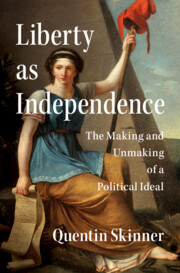Book contents
- Liberty as Independence
- Liberty as Independence
- Copyright page
- Contents
- Acknowledgements
- Conventions
- Introduction
- Part I Liberty and the Revolution of 1688
- Part II Liberty as Independence: The Ideal Entrenched
- Part III Liberty as Independence: The Ideal Betrayed
- Part IV A New View of Liberty
- 7 The New View and its Provenance
- 8 The New View Affirmed
- Part V The Rival Views in Contestation
- References
- Index
7 - The New View and its Provenance
from Part IV - A New View of Liberty
Published online by Cambridge University Press: 23 January 2025
- Liberty as Independence
- Liberty as Independence
- Copyright page
- Contents
- Acknowledgements
- Conventions
- Introduction
- Part I Liberty and the Revolution of 1688
- Part II Liberty as Independence: The Ideal Entrenched
- Part III Liberty as Independence: The Ideal Betrayed
- Part IV A New View of Liberty
- 7 The New View and its Provenance
- 8 The New View Affirmed
- Part V The Rival Views in Contestation
- References
- Index
Summary
Chapter 7 begins with the reaction that followed from Price and Paine’s defence of the colonial cause. They agreed with the colonists that to live in dependence on the arbitrary will of someone else is what it means to be a slave, and consequently agreed that the colonists must have a natural right to free themselves from their servitude, if necessary by force. This was the moment when a large number of pro-imperial spokesmen came forward to claim that the colonists and their supporters were failing to understand what it means to speak of possessing or losing one’s liberty. They objected that we are not rendered unfree if we are merely subject to someone else’s will; we are only rendered unfree if we are restrained from acting in some particular way. Generally this definition of liberty has been seen as an invention of the late eighteenth century. But as this chapter shows, it arose out of a long tradition of legal and political argument that originated with Hobbes, Pufendorf and their followers. We already find it present in England in the early eighteenth century, and the pro-imperialist writers now brought it to the forefront of debate.
- Type
- Chapter
- Information
- Liberty as IndependenceThe Making and Unmaking of a Political Ideal, pp. 173 - 197Publisher: Cambridge University PressPrint publication year: 2025

